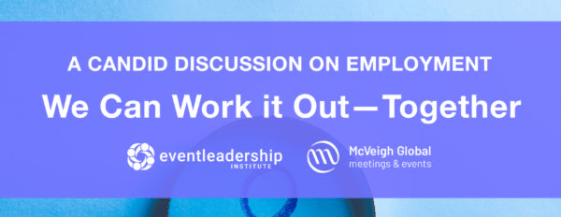It’s no question that the landscape of the independent Meeting Planner has changed over the past 18 months. New meeting formats, keeping abreast of new technologies all the while bearing an overwhelming amount of uncertainty. It’s important to remember that across internal corporate event teams, 3rd party agencies, DMOs and associated industry suppliers, no component is as fundamental to a successful event than the working meeting planner on the ground. The meetings industry has always depended on these specialists, from their local insights and knowledge to proficiency in virtual and attendee management platforms, and they will continue to do so as the freelance meeting planner adapts to the shape of things to come.
We took the opportunity to sit down with our SVP of Shared Services, Floranna Duran, and the President of Cadre, the industry’s leading resource for independent meeting professionals, Todd Taranto, for words of advice moving forward.
Q: How do you envision independent planners’ maintaining their stake in the industry in the wake of continuing uncertainly?
Floranna Duran: “With Virtual and Hybrid Events, I encourage freelancers to keep evolving, tapping into resources and continued education that will provide technical skills. At MGME we’re scaling and growing, to keep up with demand we’re keeping a close eye on the freelance market and focusing on very specific capabilities. Platform and web development, creative services and production support. Companies such as Cadre and Soundings are supporting freelancers in aligning training and certification courses to keep up with trends and technology. I encourage you to follow these companies and connect with them to see how you too can continue to thrive and evolve in this digital era.”
Q: Would you say attrition in the freelance marketplace due to the pandemic has had significant effects on the industry overall?
Todd Taranto: Significant, yes, in the short term, but I also think the effect will be short-lived. It's no surprise that event industry freelancers had to look elsewhere when their contract work was canceled, in many cases, literally overnight. Some were covered by cancellation fees, but none of them could rely on reduced wages, extended benefits, or staggered furlough plans like regular employees could. We've found that many freelancers are done with the ups and downs of this industry and won't be back. They have found more stable, greener pastures. But most others "have it in their blood" and are ready, willing, and able to come back, just as soon as there is enough volume to consistently fill up their schedules again. As soon as that leap becomes less scary, then we will see the talent come flooding back. We are already starting to.
Q: What do you see as the largest opportunities for freelancers at the current state of the industry?
Todd Taranto: “Event organizations are rebuilding, but they are conservatively doing so while managing the risk of inconsistent volume and a constantly changing landscape. This scenario represents a huge opportunity for freelancers to provide "just in time" planning labor when companies need it most. We are seeing event companies, out of necessity, contract freelance planners to get the job done because they don't have the budget to pull the trigger on a full-time hire. We are also seeing event companies, out of design, intentionally rebuilding their workforce with a variable labor component for the long-term.”
Q: Please share your thoughts/opinions on the current and future state of the freelance onsite landscape, i.e. opportunities for single or multi-day onsite needs for freelancers?
Todd Taranto: “If current conditions hold, and as the industry continues to steadily climb out of its hole, then I'd say that this is the most opportune time that I've seen for onsite event freelancers since the re-emergence of meetings after 9/11. If Cadre is a barometer for freelancer activity, then our projections show increasing and consistent onsite opportunities growing throughout the remainder of this year and reaching pre-pandemic levels by second quarter of 2022. Events may continue to have a digital component, but the thirst for face-to-face is undoubtedly strong.”
Q: Have you observed the freelance marketplace evolve in the shift from live to virtual/hybrid? Put another way, what doors have opened up for freelancers while the need for onsite or in-office support dried up during the pandemic?
Todd Taranto: “Scrappy freelancers were smart during the pandemic. They saw the shift to virtual, figured no one has really cornered the market on associated hybrid components, so they threw their hats in the ring and became event moderators, social media specialists, and the like. They went out and took courses, got certified in digital and pandemic meeting protocol, and well, got more marketable. With digital components of meetings here to stay, I can't see how this can't bring more opportunities to freelancers with these enhanced skill sets.”
Q: While no one has a crystal ball, do you have any advice for freelancers as of summer 2021?
Todd Taranto: “Like after 9/11, and frankly even more so now, the industry took a huge body blow that shook it to its core. Many people and companies that were in this industry are no longer. Established relationships and ways of doing things have been upset. In a sense, the industry has been reset, it's a blank slate. We all have a chance to rebuild it the way we want. That too goes for event industry freelancers. My advice is to be flexible, take on as much work as you can, seek opportunities not just cash, and be part of the solution as the industry rebuilds.”
Jeff Guberman
Chief Executive Officer
McVeigh Global Meetings and Events
Email Jeff
